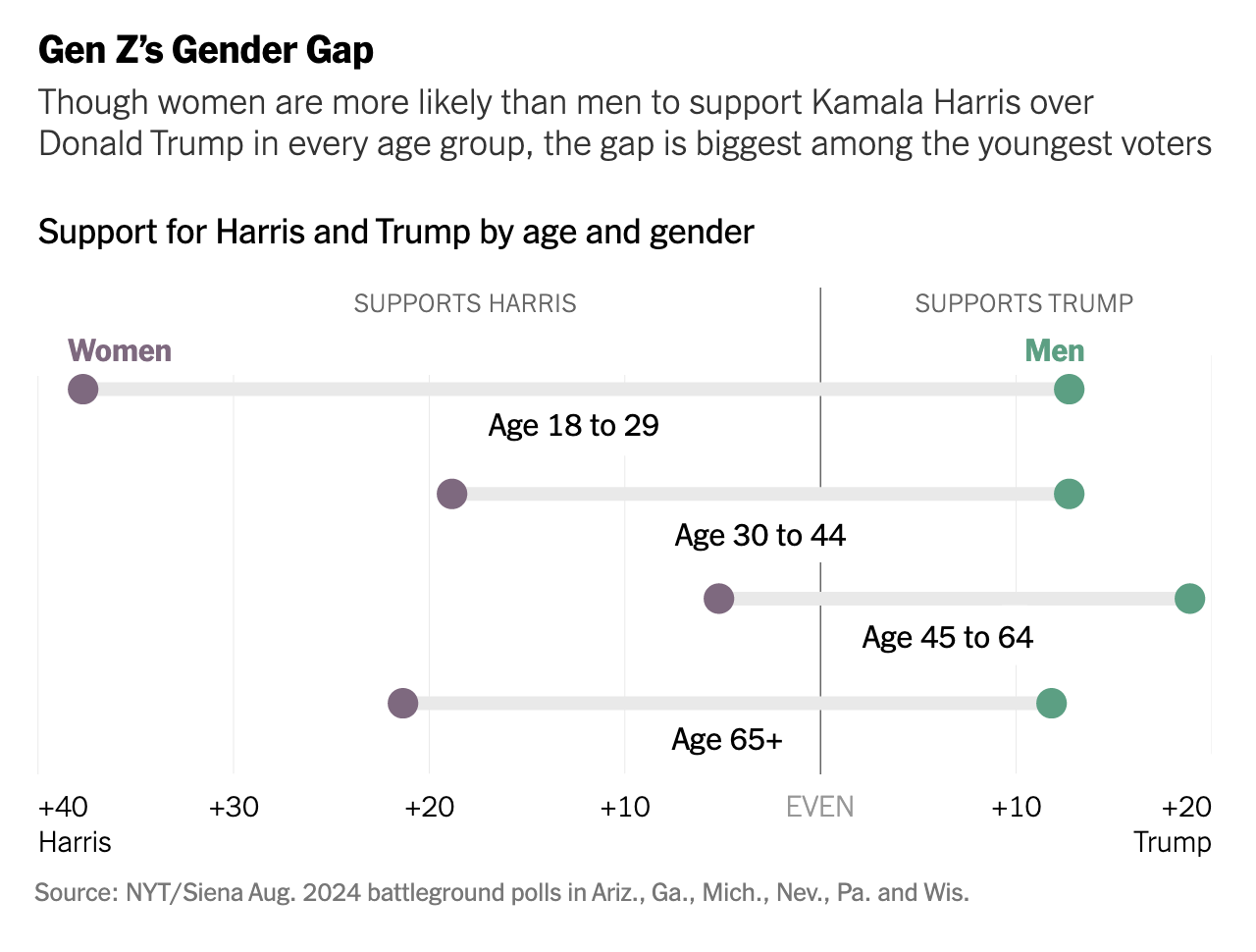Barron Trump is helping his Dad win over Gen Z men
Also: Walz's gutter obsession, refugees at Paralympics, and why Germans are taking more sick days

Trump goes for the bro vote in podcast spree
Donald Trump’s campaign is making an unexpected pivot: targeting young men under 30 through digital platforms they frequent. Instead of sticking with traditional media, Trump is appearing on podcasts and streams hosted by influential personalities popular with Gen Z like Theo Von, Logan Paul, and Adin Ross. This shift isn’t just a new media play—it’s a calculated effort to connect with a demographic feeling sidelined in today’s fast-changing world.
Gone are the days when Trump relied solely on Fox News and campaign rallies. Now, he’s diving into YouTube and Spotify, platforms where young men, increasingly alienated by mainstream political discourse, spend their time. His recent appearances aren’t just about politics—they’re about tapping into the cultural zeitgeist of young men who value authenticity over polish.
Take, for example, Trump’s recent appearance on Theo Von’s podcast, “This Past Weekend.”
Von, currently topping Spotify’s podcast charts, hosted Trump for an extended chat, where topics ranged from the economy to UFC fights. Trump even mentioned that his youngest son, Barron, is a fan of Von’s work. The 18-year-old is reportedly helping his father make connections with this young demographic.
The conversation also veered into personal territory, with Trump discussing his brother’s battle with alcoholism. These candid moments, set against the backdrop of casual banter, show a different side of Trump—a leader who’s tough but also in tune with the personal struggles many young men face.
In recent months, Trump has made the rounds on several other podcasts, each with a unique, young male audience. This week, he sat down with Shawn Ryan, a former Navy SEAL, whose podcast appeals to military veterans.
“It’s very interesting, some groups don’t really vote very much. And yet they’re great Americans,” he told Ryan. “They have to get out and vote. This is going to be the most important election in the history of our country.”

He’s also engaged with Elon Musk on X, Adin Ross and Logan Paul all of whom have massive right-leaning audiences. These interviews aren’t just about policies—they’re about creating a relatable image that resonates with young men who see Trump as more than just a politician.
Trump’s strategy taps into a new wave of masculinity among Gen Z—a mix of toughness and vulnerability. By appearing on podcasts that discuss everything from UFC to mental health, Trump is positioning himself as a leader who understands the challenges facing young men today. He’s presenting a version of masculinity that’s both traditional and adaptable, resonating with those who feel left behind by societal shifts.
The gender divide within Gen Z is stark. According to a New York Times/Siena poll of six swing states, men under 30 favor Trump by 13 points, while women of the same age overwhelmingly support Kamala Harris by a 38-point margin. This 51-point gender gap is the largest of any generation, reflecting deep polarization among the youngest voters.
This divide is rooted in the different life experiences of Gen Z. Young women are driven by issues like healthcare, climate change, and social justice, while young men prioritize economic stability and government spending. These priorities are reflected in their political leanings, with young men gravitating towards Trump’s message of economic strength and traditional values.
Media habits also play a role. Young men are more likely to engage with platforms like Reddit, Discord, and Barstool Sports, where traditional gender roles and conservative viewpoints are often reinforced. Social media algorithms then create echo chambers, amplifying these views and deepening the divide. This explains why young men are not only more likely to support Trump but also to hold traditional views on gender and leadership.
This polarization has significant implications for the future of U.S. politics. As young women push for greater representation and policy change, the backlash from young men could intensify, leading to an even more divided political landscape.
Meanwhile, Kamala Harris’s campaign is taking a different approach. Harris is focusing on progressive platforms, like RuPaul’s Drag Race, and collaborating with influencers who appeal to diverse and liberal audiences like Indian-American lifestyle influencer Vidya Gopalan and Gen Z spanish-language creator Carlos Eduardo Espina.
This strategy has energized young women but has done little to bridge the widening gender gap within Gen Z.
As the election draws nearer, the impact of this gender divide will be crucial. Despite the assumption that younger voters lean liberal, the growing support for Trump among young men could complicate predictions. If this trend continues, the anticipated liberal advantage among young voters may not be as strong as expected.
Trump’s podcast blitz is more than just a media strategy—it’s a reflection of the changing dynamics within Gen Z. By aligning himself with relatable, everyman influencers, Trump is reaching out to a demographic that feels increasingly overlooked. Whether this strategy will pay off at the ballot box remains to be seen, but one thing is clear: Trump’s digital outreach is reshaping the political landscape for the 2024 election.
In a world where gender roles are evolving, Trump’s focus on young men through these platforms highlights the deepening gender divide within Gen Z. As the election approaches, this divide could become one of the most significant factors shaping the outcome, with each side of the gender gap representing vastly different visions for America’s future.
Dig deeper:
↪ Trump hits the podcast circuit to bring young men to the polls (Washington Examiner)
↪ Many Gen Z men feel left behind. Some see Trump as an answer (NYTimes)
🗳️ 2024 Election
➤ Harris walked a delicate line on Gaza. Was it enough to appeal to activists?
Her DNC speech threaded the needle on policy and spoke to a deeply divided Democratic base — but pro-Palestinian advocates want action. (The 19th)
➤ Young Democrats have a new favorite Clinton
At the DNC, Hillary Clinton achieved something approaching icon status among Democrats coming of age. (The Atlantic)
➤ Tim Walz is passionate about gutter cleaning
The vice presidential candidate shared his “hot take” in a recent TikTok video (Architectural Digest)

🇺🇸 More Politics
➤ Supreme Court refuses to revive Biden's latest student loan debt relief plan
Republican-led states challenged the plan aimed at reducing the burden on borrowers, including a provision that would reduce their monthly payments. (NBC News)
➤ Blue and red states were putting period products in schools — then came the anti-trans backlash
For years, bills that put tampons and pads in school bathrooms were gaining traction across states. But the rise of anti-trans legislation has made a health issue political. (The 19th)
➤ What has worked to fight climate change? Policies where someone pays for polluting, study finds
To figure out what really works when nations try to fight climate change, researchers looked at 1,500 ways countries have tried to curb heat-trapping gases. Their answer: Not many have done the job. (AP)
🌎 Around the world
➤ Israel kills prominent militant as it wages its deadliest West Bank raids since the Gaza war began
The Israeli military said it killed five more militants, including a local commander, early Thursday in the West Bank as it pressed ahead with what appeared to be the deadliest military operation in the occupied territory since the start of the war in Gaza. (AP)
➤ Namibia plans to kill more than 700 animals including elephants and hippos — and distribute the meat
Namibia is planning to kill more than 700 wild animals, including elephants, zebras and hippos, and distribute the meat to the people struggling with food insecurity as the country grapples with its worst drought in 100 years. (CNN)
➤ Why badminton has become code for teen sex in Hong Kong
It may be an innocent enough racquet sport, but Hong Kong's Education Bureau has unintentionally given badminton a whole new meaning. Teaching materials released last week suggested that teenagers who wanted to have sex with each other could "go out to play badminton together" instead. (BBC News)
🥇 Paralympics
➤ Paralympics in prime time: Athletes see progress but still a long way to go
Compared to the 2024 Paris Olympics, the Paralympics – which began with Wednesday's opening ceremony – will receive a fraction of the coverage. (USA Today)
➤ Khudadadi fights for Refugee Team at Paralympics after escaping Taliban
Taekwondo fighter, now living in France, goes for gold in Paris three years after competing for Afghanistan (Guardian)

➤ As Paralympics get bigger, some athletes say cheating is more prevalent
Athletes say ‘classification doping,’ in which competitors lie about their levels of disability, is on the rise and that those in charge don’t want to police it. (Washington Post)
💰 Money
➤ The extreme renters who own nothing, not even their jeans
It’s not just leasing your car. Christmas trees, camping gear and even caskets are up for rent. (WSJ)
➤ The Gen Z ‘underconsumption’ trend: The canary in the coal mine?
The stats say consumers are still spending, but a new TikTok fad suggests a sea change is coming… (Forbes)
➤ Nation of workaholics has a new fixation: Working less
Why Germany has fallen out of love with the grind, what retirement will look like for Generation X, and how AI could be used to assess who's fit to lead. (WSJ Careers & Leadership Newsletter)
⚕️Health and wellness
➤ What to know about potentially deadly mosquito-borne virus EEE
A person in New Hampshire has died from the mosquito-borne virus eastern equine encephalitis, and Massachusetts health officials warn 10 counties are at high or critical risk from the disease that's been detected in several states. (Axios)
➤ ‘Digital switching’ is making you more bored
You’re doomscrolling because you’re bored, but you’re bored because you're scrolling through so many videos, study finds. (via Vice)
➤ I switched to a flip phone and dramatically improved my well-being
Setting aside my iPhone has led to many inconveniences but also more conversations and connection. (Washington Post)
👩💻 Technology
➤ Zuckerberg regrets bowing to Biden 'pressure' over Covid
Meta boss Mark Zuckerberg says he regrets bowing to what he calls pressure from the Biden administration to "censor" content on Facebook and Instagram during the coronavirus pandemic. (BBC News)
➤ Telegram CEO Pavel Durov charged in France over illegal activity on app
Durov's arrest in connection to illicit activity on the messaging app sparked an outcry among anti-censorship advocates. It also raised questions about how other other social media companies and executives could be held accountable for the content on their platforms.(Axios)
📡 On the radar
➤ Did Taylor Swift create a new era for food bank donations?
Since last March, Swift has donated the equivalent of hundreds of thousands of meals to help feed the growing number of Americans grappling with rising food and housing costs. (AP)
➤ British Mom defends letting 15-year-old travel without adult
British TV personality Kirstie Allsopp got backlash after she let her 15-year-old son Oscar travel Europe for three weeks with a friend. “It never occurred to me in a million years that a call from children services would be involved,” she wrote on Instagram. (TODAY)
🙏 Thanks for reading!
We are looking forward to hearing from you as we build our community. Reply to this email, drop us a note here, or slide into our DMs on Substack with your thoughts. And don’t forget to follow us on Instagram and TikTok for more news.










